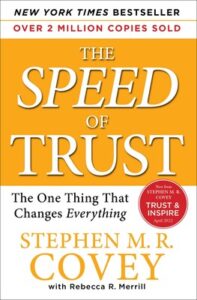Core 4 – Results, page 109.
“You can’t create a high-trust culture unless people perform.” – Craig Weatherup, CEO, PepsiCo
- Results matter! They matter to your credibility. They matter to your ability to establish and maintain trust with others.
- Returning once again to the metaphor of the tree, the results are the fruits – the tangible, measurable end purpose and product of the roots, trunk, and branches.
- To have the other three cores without results is like having a barren tree. It won’t create credibility, no matter how strong the other cores may be. And it won’t inspire confidence because the tree doesn’t produce what it was intended to produce.
- Bottom line, without results you don’t have credibility. People don’t trust you because you don’t get things done. You may have excuses. You may even have good reasons. But at the end of the day, if the results aren’t there, neither is the credibility and neither is the trust. It’s just that simple; it’s just that harsh.
- On the other hand, if you are getting results but you’re violating one of the other three cores – say you get the numbers but in a way that violates integrity, your production will not be sustainable, nor will the fruit be good. It won’t create long-term credibility and trust.
- You simply can’t get a sustainable yield of good fruit if the results are severed from the character roots.
- Four categories of people:
- Deliver results, and live the values – They should be retained and promoted.
- Neither deliver results nor live the values – They should be let go.
- Live the values but achieve low results – Trained, coached, and moved to another role. If they don’t improve, they must be let go.
- High results but poor in living the values – They need to learn to live within the company’s values or be let go.
Results – Past, Present, and Future
- There are three indicators by which people evaluate results:
- Past Performance – Your track record, your reputation, the things you’ve done, and the results you’ve already achieved.
- Current Performance – How you are performing today.
- Anticipated Performance – How people think you will perform in the future.
- Our credibility comes not only from our past results and our present results but also from the degree of confidence others have in our abilities to produce results in the future.
- The bottom line, whether you’re dealing with restoring trust or establishing it in the first place, is that it is results that will convert the cynics.
“What” and “How”
- In considering results, you always need to ask two critical questions:
- What results am I getting?
- How am I getting those results?
- Most people only ask the “what.” They have no idea that the answer to the “how” may be hurting them.
- For example, suppose you get your team to hit the numbers, but in the process, you create an adversarial win-lose competition between team members, push them until they reach burnout, and take all the credit for your team’s performance. What’s going to be the attitude of those team members the next time you challenge them to hit the numbers? Will it be easier – or harder – for you to get those results?
- That’s why you have to ask the question: How am I getting the results? The “how” can generate huge roadblocks to future results – or it can grease the skids.
- I am convinced that concerning results, the “how” matters every bit as much as the “what.”
Defining Results
- On Wall Street, I learned that “results” are the bottom line and the connection between results and credibility are often brutal.
- Off Wall Street, however, I’ve learned that wisdom suggests that we sometimes look at “results” in other ways.
- As Robert S. Kaplan and David P. Norton point out in The Balanced Scorecard, there are multiple stakeholders and measures that serve as indicators of the sustainability of financial results.
- Even when the observable results appear to be negative, you can still make huge progress in increasing your self-trust and self-confidence by recognizing, defining, and evaluating yourself on results that are not only positive, but are, perhaps, even more important in the long run.
Communicating Results
- In creating credibility with others, it’s not just the results that count; it’s people’s awareness of the results.
- It’s important to be able to appropriately communicate results to others.
How to Improve Your Results
- Take Responsibility for Results:
- Take responsibility for results – not activities.
- Simply taking responsibility for results will build credibility and trust – sometimes even when the results are not good.
- Expect to Win:
- We tend to get what we expect – both from ourselves and others.
- When we expect more, we tend to get more; when we expect less, we tend to get less.
- Having a mindset with expectations of winning increases our odds of winning. It helps us get better results. And better results help us increase our credibility and self-confidence, which leads to more positive self-expectancy, and then more winning – and the upward cycle continues.
- Finish Strong:
- Results are all about finishing.
- Beginners are many; finishers are few.
- Whenever possible, finish, and finish strong.

